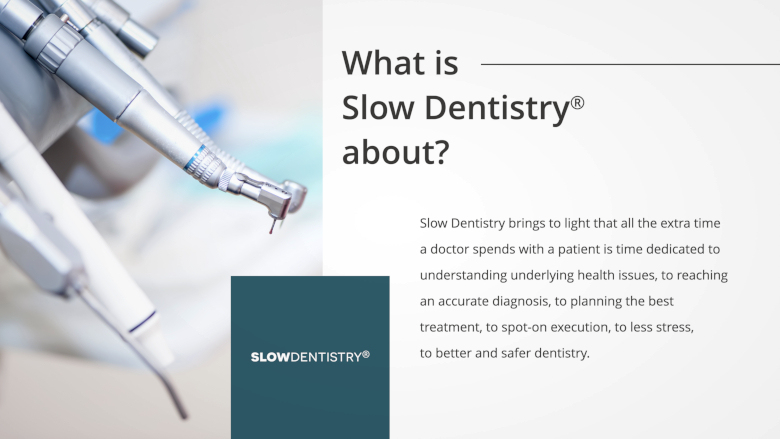Many dental professionals equate business success to practice profitability. Unfortunately, this can sometimes lead to rushed dental appointments and poor-quality treatments. In his webinar on 4 December, Dr Miguel Stanley, the clinical director of the White Clinic based in Lisbon in Portugal and a passionate advocate for high-quality dental care, will talk about how Slow Dentistry should be a fundamental human right. He will also explain why it is now more important than ever to follow the best disinfection practices in a dental clinic.
What do dental professionals need to know about Slow Dentistry, and how did the concept come about?
We live in a dental world in which so many things have been accelerated through technology, software and new workflows. Dentists have enjoyed a booming industry over the years, and those who have invested in their practices have benefited from all of the new ways of practising dentistry. However, dentistry is mostly privately owned or managed. We are seeing a growing trend in dental service organisations or dental management companies that are investing heavily in purchasing small private practices.
There is a growing understanding within the dental community that many of these privately owned and managed practices focus too much on profit over clinical excellence. We completely understand the need to make a fair living through your craft, but it cannot be at the expense of public safety and ignorance. There are various ways to save money when managing a dental practice. However, since dentistry is an aggressively competitive market, it is usually done at the expense of quality materials or salaries and the duration of appointments.
Needless to say, salaries vary from country to country, and controlling the quality of materials is an impossible task. However, at Slow Dentistry, we believe that time is a universal vector of excellence and that it is often overlooked and undervalued. There is a growing belief in clinics around the world that, in order to boost profits, one needs to try and pack as many appointments into a daily schedule as possible. There is also the belief of an unsuspecting public that a short consultation is something positive, when in fact we know that dentists have never been trained to work fast; they have been trained to provide quality service to reach the best results.
“At Slow Dentistry, we believe that time is a universal vector of excellence and that it is often overlooked and undervalued”
The whole reason behind Slow Dentistry is the communication of four basic cornerstones that cannot be contested by any dentist in the world. These cornerstones do not rely on any technology or require special education. They are ubiquitous and globally accepted as true. When applied, they guarantee that patients will be treated in a disinfected dental unit, that they will receive an explanation in terms of what will be done to them from a medical perspective, that their experience will be pain-free and that a dental dam will be used in all root canal procedures as well as in most restorative dental work. We find these to be universal rights that must always be present on a trip to the dentist.
The concept came about many years ago because I was seeing a lot of examples of failed dentistry, mostly poorly performed root canals, and could not understand why so many dental professionals were doing such a poor job. I later realised that it was mostly due to the time that the patient spent in the chair and not necessarily the fact that dentists were not good at their jobs; the clinics were simply managed in this way. Having approximately 16 appointments a day, dentists had limited time to fix all the problems.
Dental practices that work with insurance companies or sign subsidised deals with financial organisations do not usually get rated on the quality of their work or the time they take to complete a procedure, but rather on the technicality of their work. I feel that this is unacceptable to the general public.
The goal of Slow Dentistry is to improve the standard of care globally through public awareness. People have to argue for more quality chair time. We understand that this will create higher costs for the practice, but that is something that is not negotiable. These basic cornerstones have to become globally accepted and implemented. Everybody learns them at dental school, but too many people forget them when running a business.
In your opinion, why should dental professionals practise Slow Dentistry?
In my opinion, and this might sound a bit aggressive, dental practices that do not practise Slow Dentistry should not be allowed to operate. It is a basic human right of any patient to be treated in a dental chair that has been properly disinfected according to gold standard protocols. How can you do this when your turnaround time is under 20 minutes? I have had multiple conversations with many dentists in the UK who told me that in National Health Service clinics, the average turnaround time is 15 minutes. With that in mind, how could you properly invest the appropriate amount of time to disinfect the chair in between appointments and still provide quality, humane and ethical care? How can you accept that the dental dam is not used in all root canal procedures?
This paradigm must change. However, the change will not come from the industry itself as it directly affects profitability. That is why we market these simple and easily identifiable cornerstones to the general public, hoping that they will apply pressure to their dentists.
I challenge you to find one specialist who says it is impossible to practice these four simple cornerstones. The only impediment is chair time, and that should not be taken away from the patient; rather, dentists should be invested in patient care.
Slow Dentistry should not be necessary, but, unfortunately, the whole industry has almost no regulations. It has failed to regulate itself, and so it is up to the general public to impose these rules. If they wish not to be treated according to these rules, that is a different subject. However, the general public currently has no idea of their rights at a dental appointment. According to some of the leading dentists in the world, these four cornerstones are globally accepted as being profoundly important in order to establish trust, hygiene and safety during a dental consultation. Only clinics that wish to save time in order to boost profits would not be practising in this way, and we believe the public has the right to know which clinics these are.
On 4 December, you’ll be hosting your very first DT Study Club webinar on the topic. What should the participants expect from your presentation?
I am very excited about talking on this platform. I will be representing all of our honorary global ambassadors and member clinicians around the world who themselves share the same values for achieving excellence in dentistry. Excellence does not only imply high-quality work; it needs to guarantee high-quality safety. Through this pandemic, we have learnt that patient safety is something that cannot be negotiated. We are on the cusp of 2021, and we are still having to argue that a patient should always receive a dental dam for a root canal treatment and for most direct restorative work, even though we have known for years that this augments the safety and the quality of work.
During the webinar, I will be talking people through the entire process, showing them how easy it is to sign up and explaining how Slow Dentistry transitioned into a non-profit organisation run by a Swiss foundation that aims to focus on the betterment of dentistry globally. I hope to explain to our attendees that their yearly subscriptions are, in fact, donations that will help the foundation gain capital and will help share our values with patients around the world. The more member clinics we have, the more financial capital the foundation will have to carry out its work and reach a bigger audience. Hopefully including mainstream media.
I will also introduce a new website coming in 2021 with considerably more functionality. The website is for member clinics and clinicians as well as for companies that wish to support this movement. We have already received some generous donations from leading technology companies that wish to support our cause.
Original article: https://www.dental-tribune.com/news/dr-miguel-stanley-talks-about-importance-of-practising-slow-dentistry/










